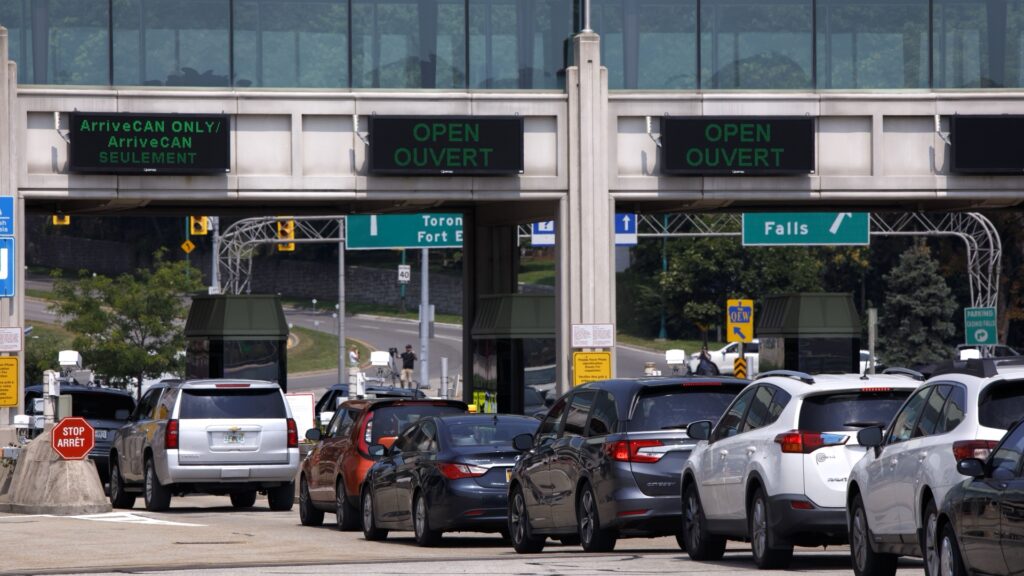
U.S. border officials say they are expecting to see increased traffic at land crossings this holiday season, starting with American Thanksgiving on Thursday and Black Friday the following day.
As such, U.S. Customs and Border Protection (CBP) and Canada Border Services Agency (CBSA) have issued a number of tips ahead of the start of holiday shopping season to make your trip across the border as smooth as possible.
CROSSING THE U.S. BORDER
CHECK BORDER WAIT TIMES
null
Travellers can check wait times at the border crossing of their choice ahead of time to save themselves the headache of waiting in line. Traffic conditions can be viewed here or on the CBP’s Border Wait Time app.
To avoid lines at the border, CBP suggests crossing during non-peak travel times.
“Peak travel times generally tend to be between the hours of 10 a.m. and 6 p.m. If you are able, leaving the night before is one way to avoid peak traffic delays,” the CBP said in a news release.
HAVE YOUR TRAVEL DOCUMENTS READY
Canadian citizens need a passport, enhanced driver’s licence, or trusted-traveller program card, like Nexus, to cross the border.
Travellers taking part in the U.S. Visa Waiver Program will need to apply for and obtain what’s called an Electronic System for Travel Authorization (ESTA) before crossing the border.
RESTRICTED ITEMS
Although legal in Canada, cannabis remains illegal at a federal level in the United States. Travellers are reminded not to cross the border with any cannabis or cannabis products.
Crossing any U.S. border or port of entry with cannabis may result in denied admission, seizure, fines, and apprehension, according to officials.
A number of other items are restricted from entering the U.S., including fruits, meats, and plants. If you’re unsure if an item is restricted, click here to consult CBP’s agricultural products guide.
CROSSING THE CANADIAN BORDER
KNOW YOUR EXCEPTION LIMITS
Canadians returning to the country after a Black Friday shopping trip should be aware of their exemption limits.
“The length of your absence from Canada determines your eligibility for an exemption and the amount of goods you can bring back, without paying any duty and taxes,” the CBSA website states.
null
For example, if your trip is less than 24 hours, you aren’t entitled to any exemptions and will be subject to duties and taxes on the declared goods imported.
If your trip is longer than 24 hours, but shorter than 48 hours, you can claim goods worth up to $200 tax free.
Trips longer than 48 hours mean you can claim goods up to $800. Any amount over that limit will be subject to duties and taxes.
Have your receipts ready to show CBSA officers and make sure your items are not gift wrapped as they may be subject to a search.
Limits on alcoholic and tobacco products differ from other goods and can be viewed here.
DON’T ARRIVE AT THE BORDER WITH CANNABIS
Although legal in Canada and in some states, arriving at the border with cannabis is strictly prohibited.
“Bringing cannabis across the border in any form, including oils containing tetrahydrocannabinol (THC) or cannabidiol (CBD), without a permit or exemption authorized by Health Canada is a serious criminal offence subject to arrest and prosecution,” the CBSA said.
It should be noted that a prescription from a doctor does not count as Health Canada authorization.
THANKSGIVING TURKEY LEFTOVERS NOT ALLOWED
If you’re returning to Canada with leftover turkey from American Thanksgiving, you’re going to have to leave it at the border.
According to the CBSA, any poultry products must be retail packaged, for human consumption, and labelled as a “Product of the USA”. Homemade food or leftovers containing poultry cannot be brought into Canada.
CANADIAN BORDER WAIT TIMES
Like entering the U.S., you can check the traffic at Canadian land crossings ahead of time to cut down your travel time.
The CBSA border wait time data is updated hourly here and shows all the traffic info at land crossings across the country.
Mondays of holiday long weekends are usually the busiest, the CBSA said. If you can, officials suggest crossing the border on another day to avoid long lines.

“The CBSA invests significant effort planning and preparing for peak periods” the federal agency said. “We monitor traveller volumes and work hard to minimize border wait times at ports of entry, including international airports, without compromising safety and security. Help us by coming prepared!”



